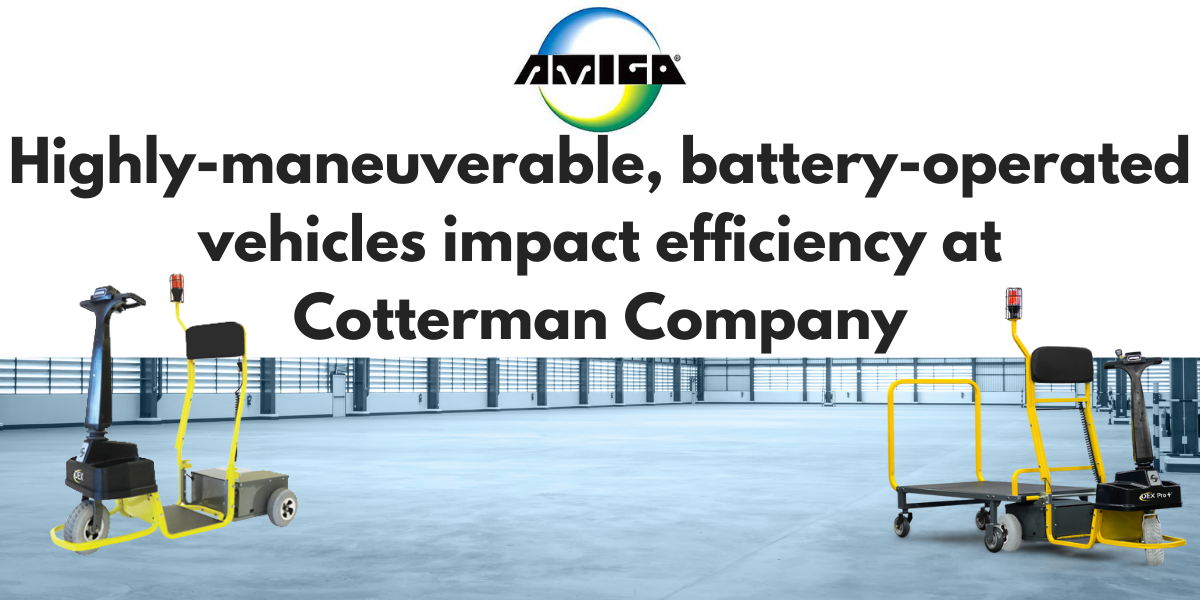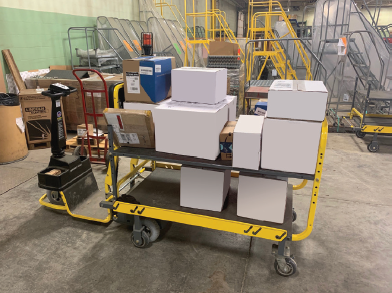At close to 300,000 square feet, walking from one end of
Cotterman Company’s main manufacturing
facility in Croswell, Mich. is about a quarter of a
mile in length. While that may not seem like
much at first, it can be if you have something
heavy to carry or push the entire distance
multiple times each day.
Add to such a trip the need to manage any
number of parcel packages containing heavy
supply items for manufacturing, disassembled machinery parts that need moving during
maintenance, or transporting a load of tools, the journey can quickly become a lot more
demanding.
While manual pushcarts or even forklifts might seem like the right approach to move
bulky or heavy items, Cotterman Company, a manufacturer of rolling metal ladders and
other industrial safety equipment, has found a more effective solution: battery-operated
motorized material handling vehicles (Amigo Mobility International, Inc.). These are
relatively small, stand-up carriers with detachable trailers which can be operated without
extensive training, but yet are very robust making them capable of transporting heavy
items or materials.
Cotterman Company initially acquired its first Amigo Dex Pro+ vehicle two years ago to
help with UPS shipment parcel deliveries to several manufacturing business units and
office areas. The Dex Pro+ has a 1,100 lbs. (498 kg) weight capacity, 24-volt battery system
that charges in a 110V outlet, operates up to 30 miles on a full charge, and a 42.5” (108 cm)
turning radius.
The company’s maintenance department has since purchased a second Amigo Dex
Pro+ to help with transporting tools as well as disassembled machinery parts that
require repair. This is mechanized efficiency using easy-to-operate vehicles, rather than
full automation, but it suits application objectives like speeding up cumbersome parts
transport tasks while reducing the chance for worker strain.
“Our facility is huge and it’s easy to walk more than five miles in an eight-hour shift,” according
to Patrick Schott, assistant maintenance manager with Cotterman Company. “For example,
if we have to take down a chain hoist, that can mean up to a quarter mile walk back to the
maintenance area. Now, we can just load up the chain hoist on the Dex Pro+’s attached trailer and
go.
Plus, we can haul all our necessary tools and don’t have to waste time traveling back and forth
to the maintenance area or wait for a forklift to deliver something to us”.
Parcels that arrive in receiving and need to make their way to any one of three manufacturing
business units include small inventory items or supplies (e.g., fasteners, specialty labels, wheels,
powder coating boxes, cartons, or other packaging materials) all of which require delivery to
various work areas.
“Before, we were using a forklift with all of the parcels stacked on a pallet, but there were several
issues with that process,” says Cotterman Company’s Project Manager, Rob Stimpson. “Using a
seat-style forklift, the delivery person had to constantly climb out and back in at every stop. Plus, a
forklift’s large size means it can’t navigate into tight work areas and visibility is compromised due
to its mast being in the direct line of sight.” Stimpson also points out that forklift operators must
be licensed. And if a temporary replacement is required to cover a vacation or other absence, that
person must also be licensed.
To address these concerns, the rolling metal ladders manufacturer began an initiative to identify
uses that were outside of a forklift’s primary functional purpose. The company set out to find any
suitable alternatives due especially to a forklift’s high purchase, maintenance, and operational
costs. “We found that the forklifts were being used for many jobs outside of their primary purpose,
most of which pertained to mobility needs,” Stimpson explains.
With the Amigo Dex Pro+, Cotterman Company implemented a vehicle type that not only helped
to reduce operational costs but provided a significant functional advantage. The company’s
delivery person can now more easily execute daily requirements using the Dex Pro+ versus a
forklift, due to its higher level of maneuverability, with allows closer, easier access to shelving and
storage locations. Visibility on these vehicles also improves, in comparison to lift trucks with masts,
and the operator can easily step off of a low platform. In addition, loading the vehicle’s attached
trailer can be done right at the UPS truck. It all adds up to less strain for operators, and time
savings for operations.
“Since we’ve started using the Dex Pro+, the time it takes to deliver parcels throughout our facility
has been nearly cut in half,” concludes Stimpson. “It provides us a high degree of value that we’re
really pleased with.”
For applications or questions concerning Amigo, reach out to Southern Representatives!



